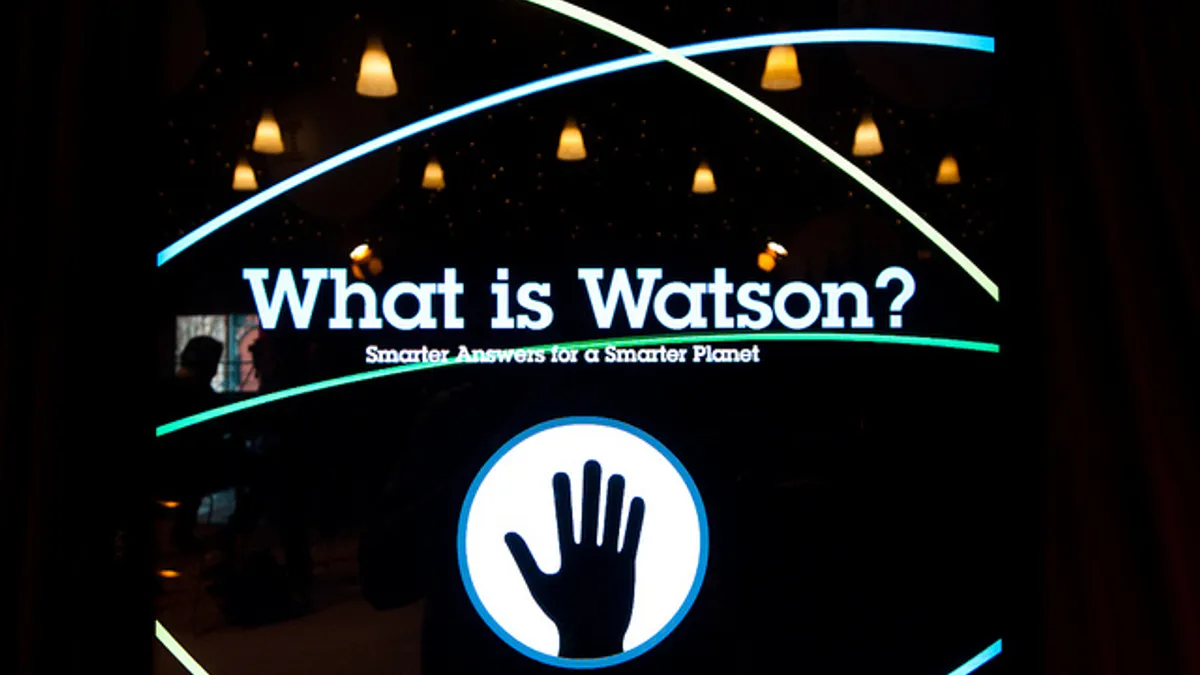As tech giants make bigger leaps into artificial intelligence, they see marketers as key customers for a variety of services and are promising more nuance and layers than the technology's early days might suggest.
Companies such as IBM, Salesforce and others believe AI has the potential to transform marketing as much as the digital revolution has over the past several years. IBM, which first made an AI media splash in 1997 when its Deep Blue supercomputer beat chess champion Garry Kasparov, has emerged as an early market leader with newer, smarter Watson software.
Google is also ramping up R&D spend on AI; Microsoft is integrating AI across its enterprise; Facebook is building out facial recognition AI for basic user experiences and Salesforce is championing a new platform called Einstein to help optimize for individual customer data. In late September, some of the companies in AI banded together to create the Partnership on Artificial Intelligence to Benefit People and Society, a group with the objective of addressing opportunities and challenges, along with standards and best practices, for AI developers.
Interviews with executives at IBM and Salesforce suggest that AI's ability to quickly analyze mountains of data is one of the technology's biggest benefits for marketers. Because, by helping brands learn more about their customers and which business practices are most critical to success, AI could provide a competitive edge.
“[AI] marketing solutions learn in an expert way, which is critical for marketing professionals who want to uncover insights hidden in their massive amounts of data," Maria Winans, CMO of IBM Commerce, told Marketing Dive.
Taking Watson beyond the elementary
Technology like Watson has "cognitive capabilities" that often serve more as an augmentation to the human element than as a completely independent intelligence, Winans noted.
“Cognitive capabilities enhance a marketer’s experience and knowledge, not replace it,” she said. “This is a little different than AI, where the algorithms make the decisions for you."
Two major strengths for cognitive capabilities are their impact on personalization and on customer insights for segmentation. Watson offers a number of cognitive solutions that address these areas:
- IBM Watson Customer Experience Analytics taps into a variety of behavioral data such as shopping patterns, buying trends and more, to understand which customers are the right target for a campaign. This segmentation occurs through visualizations and natural language interactions between the marketer and AI tech.
- IBM Watson Content Hub uses cognitive capabilities to understand and learn about the data in a company’s content management system. The hub tags content like images, videos and documents based on millions of previous examples. Through the AI, choosing campaign content becomes more automated.
- IBM WeatherFX for IBM Marketing Cloud gives marketers access to weather event insights from the Weather Company and IBM Business by identifying more than 200 weather events based on over three million data points. Weather forecasts gleaned from this program can then help retail brands prepare for major events like snowstorms, which affect consumer demands for certain stock, along with shipping processes.
Watson-powered features like these ultimately serve, not as fully automated replacements for human creatives, but useful helpers who can account for data that would otherwise be incredibly difficult — even impossible — to digest otherwise.
"Honestly, I like to think of Watson as a trusted advisor," Winans said. "A colleague that marketers can collaborate with to expand their expertise and help drive better results.”
Predicting the future with Salesforce Einstein
While Watson is becoming more device-agnostic and extending use to third-parties, Salesforce’s recently launched Einstein platform was specifically built to integrate with the brand's flagship CRM and Marketing Cloud products. The upside for Salesforce users is that the technology is now baked into existing solutions; the downside is that marketers need to operate within Salesforce's ecosystem to utilize the AI tech.
Einstein's benefits include automatically pulling customer insights and predicting outcomes so “business decisions can be made with confidence," said Leslie Fine, VP of data and analytics at Salesforce.
After establishing email leads, Einstein can help marketers and sales teams understand which ones are more likely to close a sale and then recommend next best business actions, as well as areas to direct effort and spend.
For example, ShopAtHome is leveraging Einstein to redefine the timing and content of email marketing campaigns. The e-commerce brand's Einstein effort has already resulted in a 23% lift in email clicks and a 30% increase in email opens.
“Overall, users will be able to deliver more predictive and personalized customer experiences across sales, service, marketing and commerce using the power of AI,” Fine said. “Additionally, CRM users will be able to quickly and easily build AI-powered apps using Einstein.”
Within the Marketing Cloud component of Einstein, marketers have access to predictive analytics over key marketing decision points such as optimal timing, channel content and target audience. Without this data, marketers would be stuck relying on past consumer behavior alone, which can be severely limiting.
“Because customers’ preferences, behaviors and expectations change in real-time, it’s not enough to simply look back at what customers did previously to make a decision,” Fine said. “Marketers need insights from both historical and real-time data to understand what customers might do next, in order to reach them with the most personalized, relevant experiences possible.”
And while AI may seem confined to the ethereal digital space, it's potential for physical integration is actually underestimated. With more than 90% of shopping still done in brick-and-mortar stores, Fine predicts every customer who walks into a store will soon be able to interact with a chatbot that knows his or her shopping history, preferences and other relevant information and can make recommendations, offer special discounts and handle customer service issues.
So where is AI headed next?
Both Winans and Fine suggest AI is going to bring about the convergence of marketing tech and ad tech in the near future. In early November, Forrester Research predicted this melding could become a major driver of ad quality, and Fine agreed it will likely lead to smarter programmatic and ad buying.
Salesforce's recent acquisition of the data management platform Krux is an indicator of the move toward more precision, per the exec. “Krux will feed Salesforce Einstein with billions of new signals, enabling companies to be even smarter about their customers,” she said.
The convergence of marketing tech and ad tech will further improve the ability of marketers to coordinate the customer journey across the channels, organizations and technologies that drive engagement, according to Winans. She also envisions a future where AI will bolster creative efforts for marketing content.
“The intersection of content and cognitive is also a big area of opportunity for both advertising and marketing campaigns," Winans said, noting this will create more content variations, improve the dynamic assembly of content and help figure out the type and volume of content that needs to be created.
As AI technology rapidly proliferates and integrates with the day-to-day life of not just cutting-edge tech developers but the everyday consumer, it has the potential to change the way brands think about business on the whole.
“Integrating AI across marketing and sales technology will free the marketer and the sales professional from the task of digging through piles of data and manually making assumptions," Fine said. "This will [...] empower salespeople and marketers to strategically make big picture decisions based on data that stand to make a bigger impact.”






















